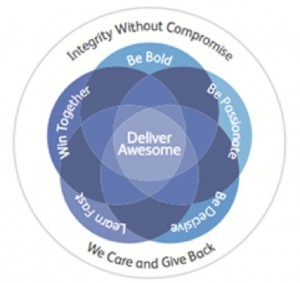Why A CEO Would Make A Public Apology
Amazing. The CEO of Intuit posts a public apology on LinkedIn.
 In this post, Brad Smith, the president and CEO of Intuit, openly admits to and apologizes for a mistake the company made with a change to the CD/download version of their extremely popular TurboTax desktop software. He states:
In this post, Brad Smith, the president and CEO of Intuit, openly admits to and apologizes for a mistake the company made with a change to the CD/download version of their extremely popular TurboTax desktop software. He states:
Our intention was to align our desktop, online and mobile versions to deliver faster innovation and improved experiences for all customers, but our execution left much to be desired. We didn’t communicate enough before implementing the change, and we were slow to react once we began hearing the much-deserved anger and disappointment from some of our customers. Simply stated, we messed up.
The problem? Customers were forced to upgrade their version of TurboTax, even though their tax situation hadn’t changed from the year before. And key tax schedules (C, D, E, and F) were suddenly gone.
In other words, making surprise changes, taking key things away, and forcing them to pay more. No wonder customers were angry; and they were not hesitant to let the company know it.
So a response from the company was definitely warranted. And as one might expect, the TurboTax General Manager acknowledges customer concerns and outlines a compensation plan on the company blog.
Now, to be fair, most of Intuit’s sales on TurboTax occur in the first weeks of the New Year, as individuals, businesses, and accountants prepare to file their tax returns. If Intuit didn’t respond quickly, they risk losing hundreds of thousands (or millions) of customers. So having some kind of response to customer complaints makes sense.
But what caught my attention was the public apology by the CEO. This is not a common occurrence, especially from such larger companies as Intuit. So I did a little digging into the company’s values.
A review of the Intuit’s values provides some useful insight on why the CEO published an apology.
Intuit’s Operating Values
 Intuit has been around since 1983. After ten years in business, they established a set of operating values. In 2014, they revised them into their current format of eight Operating Values, as follows:
Intuit has been around since 1983. After ten years in business, they established a set of operating values. In 2014, they revised them into their current format of eight Operating Values, as follows:
- Integrity without Compromise – it’s about trust and being accountable.
- We Care and Give Back – it’s about sustainability and community involvement
- Be Bold – it’s about encouraging creativity, inspiring vision, and being courageous.
- Be Passionate – in addition to having passion it’s also about competence.
- Be Decisive – it’s about leadership and being transparent.
- Learn Fast – it’s also about leadership and personal growth.
- Win Together – it’s about achievement and delivering results.
- Deliver Awesome – it’s about building a strong brand by focusing on the customer.
All eight values (which I think are too many) have links to the 17 common values that most companies share. So what’s so special about these values?
Look Underneath
To understand what prompted the CEO’s apology, we have to look at the subtle elements of how these values are defined. Here are a few that stand out:
- Be transparent (under Be Decisive). The CEO shows his willingness to be vulnerable, and explain what went wrong.
- Be direct and respectful (under Be Decisive). The CEO is being true to this promise.
- Lead with a hypothesis (under Learn Fast). The CEO highlights the fact they tried an idea, and it failed. Now they are fixing it and moving on.
- Measure and act on what matters most (under Learn Fast). The CEO clearly states they heard from a lot of customers over a 2-week period. More importantly, they were willing to act on this feedback.
- Speak the truth and assure best intent (under Integrity Without Compromise). The CEO plainly outlines what they did and why they did it. Then he highlights what they’ve now learned from the experience.
- Hold ourselves… accountable (under Integrity Without Compromise). The CEO takes full responsibility for the company’s actions, and commits to re-earning their customers’ trust.
The key to moving past a mistake is: owning and acknowledging it; apologizing for it; doing whatever it take to fix it; and last but not least, showing you learned from it.
Intuit’s CEO clearly did all of that. It’s a great illustration of leading by example.
When the CEO of a company embodies the stated values, to me, this suggests all employees will live by them. This in turn creates true competitive advantage.
Clearly, Intuit is a company to watch!
What do you think of this CEO’s apology?








